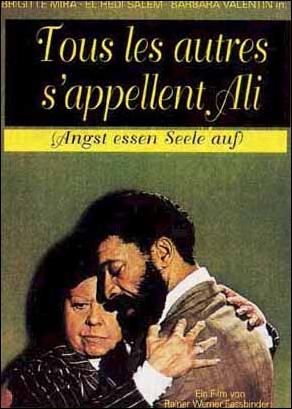Fiche Personne
Théâtre
Cinéma/TV

Rainer Werner Fassbinder
Réalisateur/trice, Metteur/se en scène, Acteur/trice, Scénariste
Allemagne

Français
Un des cinéastes allemands majeurs. Dans TOUS LES AUTRES S’APPELLENT ALI (1974), Rainer Werner FASSBINDER s’attaque au racisme et au préjugé autour d’un expatrié marocain en Allemagne.
English
Publications
Books:
Limmer, Wolfgang, Fassbinder, Munich, 1973.
Thomsen, Christian, I Fassbinders Spejl, Copenhagen, 1975.
Pflaum, Hans, Das bisschen Realitat, das ich brauche: Wir Filme entstehen, Munich, 1976.
Rayns, Tony, Fassbinder, London, 1976.
Peter, Jansen, and Wolfram Schütte, editors, Reihe Film 2: Rainer Werner Fassbinder, Munich, 1979.
Sandford, John, The New German Cinema, Totowa, New Jersey, 1980.
Baer, Harry, Schlafen kann ich, wenn ich tot bin: Das atemlose Leben des Rainer Werner Fassbinder, Cologne, 1982.
Eckhardt, Bernd, Rainer Werner Fassbinder: Im 17 Jahren 42 Filme-Stationen eines Lebens fur den Deutschen Film, Munich, 1982.
Iden, Peter, and others, Rainer Werner Fassbinder, Munich, 1982.
Raab, Kurt, and Karsten Peters, Die Sehnsucht des Rainer Werner Fassbinder, Munich, 1982.
Foss, Paul, editor, Fassbinder in Review, Sydney, 1983.
Franklin, James, New German Cinema: From Oberhausen to Hamburg, Boston, 1983.
Fassbinder, Rainer Werner, Film Befreien den Kopf: Essays und Arbeitsnotizen, edited by Michael Töteburg, Frankfurt, 1984.
Hayman, Ronald, Fassbinder: Film-maker, London, 1984.
Phillips, Klaus, New German Filmmakers: From Oberhausen Through the 1970s, New York, 1984.
Fassbinder, Rainer Werner, Die Anarchie der Phantasie: Gespräche und Interviews, edited by Michael Töteburg, Frankfurt, 1986.
Katz, Robert, and Peter Berling, Love Is Colder Than Death: The Life and Times of Rainer Werner Fassbinder, London 1987.
Shattuc, Jane, Television, Tabloids, and Tears: Fassbinder and Popular Culture, Minneapolis, 1995.
Elsaesser, Thomas, Fassbinder’s Germany: History, Identity, Subject, Amsterdam, 1996.
Kardish, Laurence, editor, Rainer Werner Fassbinder, New York, 1997.
Articles:
Thomas, Christian Braad, « Fassbinder’s Holy Whores, » in Take One (Montreal), July-August 1973.
Sander, Helke, « Die Darstellung alter Frauen in Film, » in Frauen und Film (Berlin), no. 3, 1974.
Grant, J., in Cinéma (Paris), July-August 1974.
Rayns, Tony, in Sight and Sound (London), Autumn 1974.
Amengual, Barthélemy, in Positif (Paris), September 1974.
Hepnerova, E., in Film a Doba (Prague), September 1974.
Sauvaget, D., in Image et Son (Paris), September 1974.
Canby, Vincent, in New York Times, 7 October 1974.
Combs, Richard, in Monthly Film Bulletin (London), November 1974.
Farber, Manny, and Patricia Patterson, « Rainer Werner Fassbinder, » in Film Comment (New York), November-December 1975.
Hughes, John, and Brooks Riley, « A New Realism: Fassbinder Interviewed, » in Film Comment (New York), November-December 1975.
Thomas, Paul, « Fassbinder-The Poetry of the Inarticulate, » in Film Quarterly (Berkeley), Winter 1976-1977.
Franklin, James, « Method and Message: Forms of Communication in Fassbinder’s Angst essen Seele auf, » in Literature/Film Quarterly (Salisbury, Maryland), no. 3, 1979.
Santamaria, J. V. G., in Contracampo (Madrid), 1980.
Stefanoni, L., in Cineforum (Bergamo), January-February 1982.
Woodward, K. S., « European Anti-Melodrama: Godard, Truffaut, and Fassbinder, » in Post Script (Jacksonville, Florida), Winter 1984.
Hartsough, D., « Cine-feminism Renegotiated: Fassbinder’s Ali as Interventionist Cinema, » in Wide Angle (Baltimore, Maryland), no. 1, 1990.
LaValley, A., « The Gay Liberation of Rainer Werner Fassbinder: Male Subjectivity, Male Bodies, Male Lovers, » in New German Critique, no. 63, Fall 1994.
Sharma, S., « Fassbinder’s Ali and the Politics of Subject Formation, » in Post Script (Commerce, Texas), vol. 14, no. 1-2, 1994-95.
Reimer, R.C., « Comparison of Douglas Sirk’s All That Heaven Allows and Rainer Werner Fassbinder’s Ali: Fear Eats the Soul; or, how Hollywood’s New England Dropouts Became Germany’s Marginalized Other, » in Literature/Film Quarterly (Salisbury, Maryland), vol. 24, no. 3, 1996.
Medhurst, Andy, « The Long Take, » in Sight and Sound (London), vol. 6, no. 2, February 1996.
See more here .
Books:
Limmer, Wolfgang, Fassbinder, Munich, 1973.
Thomsen, Christian, I Fassbinders Spejl, Copenhagen, 1975.
Pflaum, Hans, Das bisschen Realitat, das ich brauche: Wir Filme entstehen, Munich, 1976.
Rayns, Tony, Fassbinder, London, 1976.
Peter, Jansen, and Wolfram Schütte, editors, Reihe Film 2: Rainer Werner Fassbinder, Munich, 1979.
Sandford, John, The New German Cinema, Totowa, New Jersey, 1980.
Baer, Harry, Schlafen kann ich, wenn ich tot bin: Das atemlose Leben des Rainer Werner Fassbinder, Cologne, 1982.
Eckhardt, Bernd, Rainer Werner Fassbinder: Im 17 Jahren 42 Filme-Stationen eines Lebens fur den Deutschen Film, Munich, 1982.
Iden, Peter, and others, Rainer Werner Fassbinder, Munich, 1982.
Raab, Kurt, and Karsten Peters, Die Sehnsucht des Rainer Werner Fassbinder, Munich, 1982.
Foss, Paul, editor, Fassbinder in Review, Sydney, 1983.
Franklin, James, New German Cinema: From Oberhausen to Hamburg, Boston, 1983.
Fassbinder, Rainer Werner, Film Befreien den Kopf: Essays und Arbeitsnotizen, edited by Michael Töteburg, Frankfurt, 1984.
Hayman, Ronald, Fassbinder: Film-maker, London, 1984.
Phillips, Klaus, New German Filmmakers: From Oberhausen Through the 1970s, New York, 1984.
Fassbinder, Rainer Werner, Die Anarchie der Phantasie: Gespräche und Interviews, edited by Michael Töteburg, Frankfurt, 1986.
Katz, Robert, and Peter Berling, Love Is Colder Than Death: The Life and Times of Rainer Werner Fassbinder, London 1987.
Shattuc, Jane, Television, Tabloids, and Tears: Fassbinder and Popular Culture, Minneapolis, 1995.
Elsaesser, Thomas, Fassbinder’s Germany: History, Identity, Subject, Amsterdam, 1996.
Kardish, Laurence, editor, Rainer Werner Fassbinder, New York, 1997.
Articles:
Thomas, Christian Braad, « Fassbinder’s Holy Whores, » in Take One (Montreal), July-August 1973.
Sander, Helke, « Die Darstellung alter Frauen in Film, » in Frauen und Film (Berlin), no. 3, 1974.
Grant, J., in Cinéma (Paris), July-August 1974.
Rayns, Tony, in Sight and Sound (London), Autumn 1974.
Amengual, Barthélemy, in Positif (Paris), September 1974.
Hepnerova, E., in Film a Doba (Prague), September 1974.
Sauvaget, D., in Image et Son (Paris), September 1974.
Canby, Vincent, in New York Times, 7 October 1974.
Combs, Richard, in Monthly Film Bulletin (London), November 1974.
Farber, Manny, and Patricia Patterson, « Rainer Werner Fassbinder, » in Film Comment (New York), November-December 1975.
Hughes, John, and Brooks Riley, « A New Realism: Fassbinder Interviewed, » in Film Comment (New York), November-December 1975.
Thomas, Paul, « Fassbinder-The Poetry of the Inarticulate, » in Film Quarterly (Berkeley), Winter 1976-1977.
Franklin, James, « Method and Message: Forms of Communication in Fassbinder’s Angst essen Seele auf, » in Literature/Film Quarterly (Salisbury, Maryland), no. 3, 1979.
Santamaria, J. V. G., in Contracampo (Madrid), 1980.
Stefanoni, L., in Cineforum (Bergamo), January-February 1982.
Woodward, K. S., « European Anti-Melodrama: Godard, Truffaut, and Fassbinder, » in Post Script (Jacksonville, Florida), Winter 1984.
Hartsough, D., « Cine-feminism Renegotiated: Fassbinder’s Ali as Interventionist Cinema, » in Wide Angle (Baltimore, Maryland), no. 1, 1990.
LaValley, A., « The Gay Liberation of Rainer Werner Fassbinder: Male Subjectivity, Male Bodies, Male Lovers, » in New German Critique, no. 63, Fall 1994.
Sharma, S., « Fassbinder’s Ali and the Politics of Subject Formation, » in Post Script (Commerce, Texas), vol. 14, no. 1-2, 1994-95.
Reimer, R.C., « Comparison of Douglas Sirk’s All That Heaven Allows and Rainer Werner Fassbinder’s Ali: Fear Eats the Soul; or, how Hollywood’s New England Dropouts Became Germany’s Marginalized Other, » in Literature/Film Quarterly (Salisbury, Maryland), vol. 24, no. 3, 1996.
Medhurst, Andy, « The Long Take, » in Sight and Sound (London), vol. 6, no. 2, February 1996.
See more here .
Partager :




